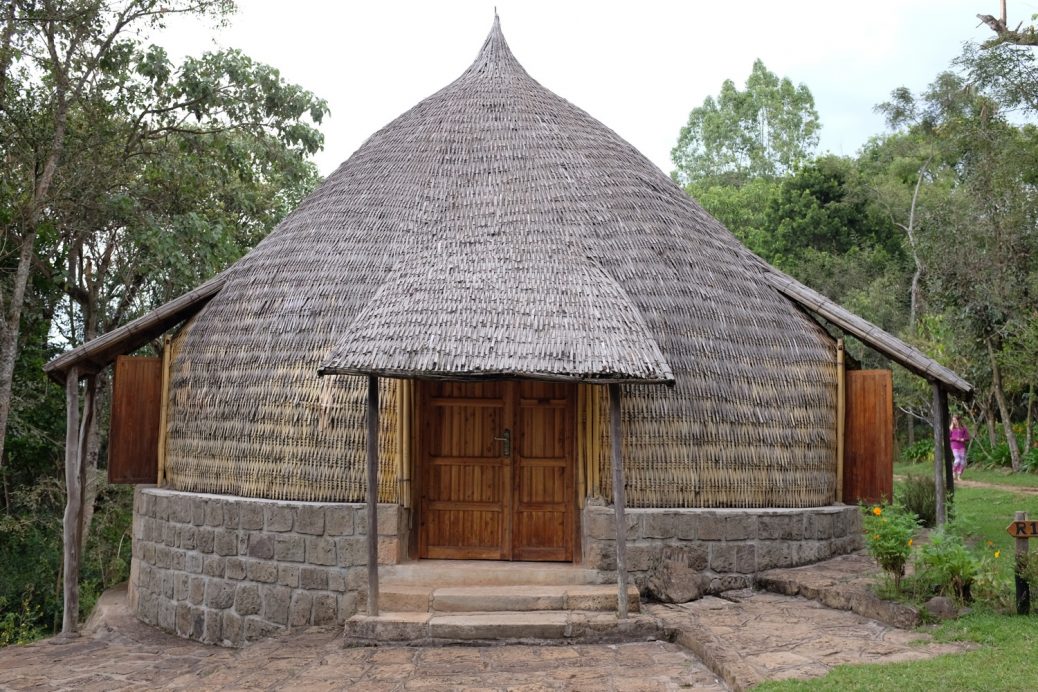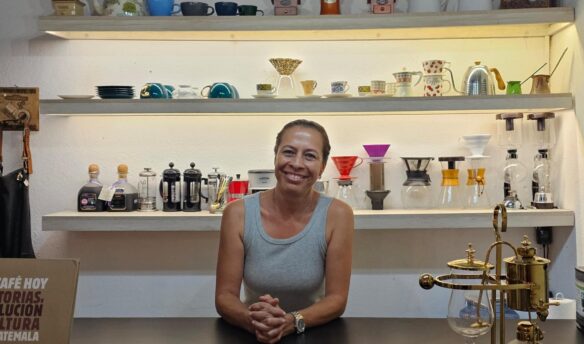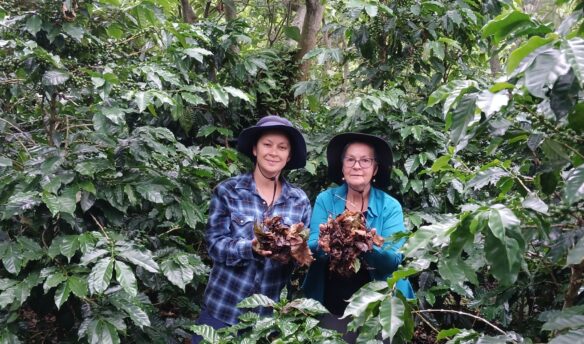(Photo: Emily McIntyre.)
Since November 2016, Emily McIntyre has been living in Ethiopia with her husband and five-year-old daughter, Eire. As part of their work with Catalyst Coffee Consulting, the McIntyres have been traveling around the country to partner with producers, mills, and processing/export professionals. Their efforts are focused on education, deepening relationships, and moving toward truly progressive Ethiopian coffee. Read part one and part two.
[A]s a coffee person, I’ll wager you’ve either visited the Aregash Lodge or seen photos, probably of a beautiful Ethiopian woman in traditional garb serving coffee, or buna, surrounded by flowers and with a mysterious half-smile on her face.
After Awassa, the roads from Addis south to coffee lands worsen dramatically: the ill-made road melts like butter under heavy trucks, then reshapes into unavoidable roadblocks; donkeys, oxen, and humans cross the road with no care for their skins, and eventually the idea of asphalt is abandoned altogether. Just past Yirgalem, the historic capital of the Sidama Zone, the green gates of the Aregash open to the dusty traveler like temple gates to a seeker. Smiling staff members greet you with fresh seasonal juice and lead the way along a stone path to your rooms: traditional Sidama-style bamboo Tukul huts, each handmade over the course of four months to the vision of Gregory Missaelides, who greets each guest at dinner with the smiling question, “You want more soup?”
Aregash sits on land that’s been in the Missaelides family for three generations. Gregory’s grandfather fought for Sidama governor Ras Desta under the last Emperor of Ethiopia, Haile Selassie, against the incursion of the Italians in 1935. His weapons are still hanging on the walls of the office hut at Aregash. When the Dirg came to power in Ethiopia, it was a dark time for any Ethiopians with royal blood. Emperor Haile Selassie’s daughter, Princess Tenegnework, had married Ras Desta and become his widow when the Italians captured and killed him on the border of Somalia. Rather than giving Princess Tenegnework up to the Italian occupiers, the Missaelides family sheltered her deep in their lands, in a cave not far from the river. Eventually she made her way to political refuge in the UK. Gregory was born shortly thereafter, in 1937.
“I grew up in the Sidama huts,” he says in broken English (the family collectively speaks Amharic, Sidaama, Greek, Italian, and English) “and I would wake up too early to go out. My father would tell me to wait until it got warmer, and I would lay there and look up at the bamboo ceiling.”

When his mother died, he gathered his eleven siblings together at her funeral and convinced them to devote the land of what had been a full-time, working coffee estate to build the huts and hospitality of the Aregash Lodge, which was named after her. “This is art,” he says, gesturing at the conical huts with their weathering grey bamboo roofs and golden wood doors. “I have to do something for the world, and so I have done this.” In Sidama, as throughout Ethiopia, corrugated iron is beginning to replace the traditional building materials. At least at the Aregash, the world continues as it was, all graceful curving walls and ceiling shadow play.
The Aregash is an eco-lodge, built in 2002 when the concept was still new. Electricity comes from a mixture of solar power and a unique use of compost. Only endemic plants are cultivated; outside each cabin are one small coffee plant and one small enset, or false banana, a nod to the agricultural and economical focus of the area. Food is drawn from the beautiful hillside garden not far from the chicken pen, and from nearby farmers—the Missaelides family takes seriously their mission to make a positive impact on the community.
Most of the land is a wildlife refuge, says Andreas Missaelides, Gregory’s son. “For eight years now we have been creating a preserve for the indigenous Menelik bushback.” Hyenas are fed every night at the bottom of the hill, their shambling walk and horrifying laugh fascinating to guests who gather around the fire for the traditional buna ceremony, popcorn, and to catch a glimpse of the condors that flap overhead, wings easily five feet across.
For foreigners mincing their way through Ethiopia, wistfully eyeing salads and greens but uncertain of their provenance, the Aregash Lodge is a gift. The staff here lovingly produce mind-blowing food for each meal, a crisp simple salad in a restrained vinaigrette opposite traditional injera and shiro, balanced by a leg o’ lamb that has obviously been steeping in its own juices in a slow oven for hours. Coffee here is grown and processed on site—thirty to forty bags are produced yearly, depending on environmental factors.
Coffee people have been using the Aregash Lodge as a hub for exploration since it was built, along with tourists, philanthropists, and aid or research workers. Gregory has a strong affection for coffee folks, never forgetting the property’s origin as a coffee farm. “Every year we have from all over the world coffee buyers and roasters come. My family are farmers. When we have all these people in the same line of work, that makes it possible for us to do this.”
Many guests come year after year, like Mike Stemm of Dominion Trading, who reckons this year is his twentieth visit to the lodge. When asked what he treasures about the place, he pauses and smiles, years of memory dancing on his face. “The relationship with Gregory. We’re friends. And this place, it’s like an oasis—a time to relax, refresh, enjoy the beauty of this very special place.”
—Emily McIntyre is a regular contributor to Fresh Cup, and the co-founder of Catalyst Coffee Consulting and Crema.co.
















